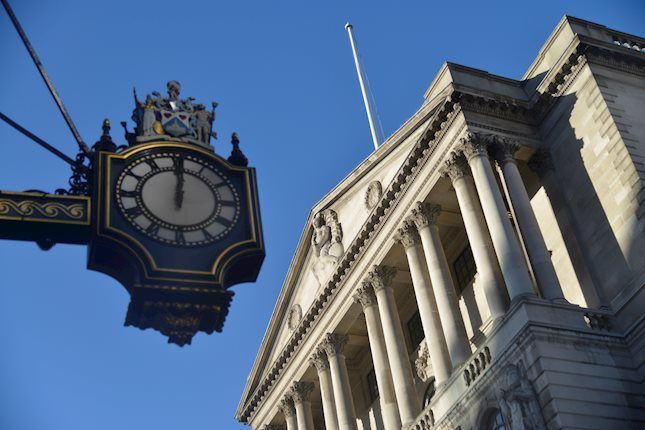- GBP/USD draws support from a combination of factors, albeit it lacks bullish conviction.
- Expectations for a slower BoE rate-cutting cycle continue to underpin the British Pound.
- Bets for a larger Fed rate cut in September weigh on the USD and further lend support.
The GBP/USD pair trades with a positive bias around mid-1.3100s during the Asian session on Thursday, albeit it lacks strong follow-through buying and remains below the weekly top touched the previous day.
The British Pound (GBP) continues to be underpinned by expectations that the Bank of England's (BoE) rate-cutting cycle is more likely to be slower than in the Eurozone or the United States. The bets were lifted by a survey from the British Retail Consortium, which showed that spending in August increased by 1.0% YoY – marking the strongest uptick since March. This, along with a softer US Dollar (USD), turns out to be a key factor acting as a tailwind for the GBP/USD pair.
The Job Openings and Labor Turnover Survey (JOLTS) published on Wednesday showed that job openings fell to 7.673 million in July, or the lowest level since January 2021. Apart from this, dovish remarks by Fed officials lifted bets for a larger interest rate cut at the upcoming FOMC policy meeting on September 17-18 and dragged the US Treasury bond yields to over a one-year low. This, in turn, keeps the USD bulls on the defensive and offers some support to the GBP/USD pair.
That said, the cautious market mood helps limit the downside for the safe-haven Greenback. Traders also seem reluctant to place aggressive directional bets ahead of the crucial US monthly employment data – popularly known as the Nonfarm Payrolls (NPF) report on Friday. This, in turn, is seen capping the upside for the GBP/USD pair. Nevertheless, the fundamental backdrop seems tilted in favor of bulls and suggests that the path of least resistance for spot prices is to the upside.
Heading into the key data risk, investors on Thursday will take cues from the US economic docket – featuring the ADP report on private-sector employment, the usual Weekly Initial Jobless Claims and the ISM Services PMI. This, along with the US bond yields and the broader risk sentiment, might drive the USD demand and produce short-term trading opportunities around the GBP/USD pair later during the early North American session.
BoE FAQs
The Bank of England (BoE) decides monetary policy for the United Kingdom. Its primary goal is to achieve ‘price stability’, or a steady inflation rate of 2%. Its tool for achieving this is via the adjustment of base lending rates. The BoE sets the rate at which it lends to commercial banks and banks lend to each other, determining the level of interest rates in the economy overall. This also impacts the value of the Pound Sterling (GBP).
When inflation is above the Bank of England’s target it responds by raising interest rates, making it more expensive for people and businesses to access credit. This is positive for the Pound Sterling because higher interest rates make the UK a more attractive place for global investors to park their money. When inflation falls below target, it is a sign economic growth is slowing, and the BoE will consider lowering interest rates to cheapen credit in the hope businesses will borrow to invest in growth-generating projects – a negative for the Pound Sterling.
In extreme situations, the Bank of England can enact a policy called Quantitative Easing (QE). QE is the process by which the BoE substantially increases the flow of credit in a stuck financial system. QE is a last resort policy when lowering interest rates will not achieve the necessary result. The process of QE involves the BoE printing money to buy assets – usually government or AAA-rated corporate bonds – from banks and other financial institutions. QE usually results in a weaker Pound Sterling.
Quantitative tightening (QT) is the reverse of QE, enacted when the economy is strengthening and inflation starts rising. Whilst in QE the Bank of England (BoE) purchases government and corporate bonds from financial institutions to encourage them to lend; in QT, the BoE stops buying more bonds, and stops reinvesting the principal maturing on the bonds it already holds. It is usually positive for the Pound Sterling.
Information on these pages contains forward-looking statements that involve risks and uncertainties. Markets and instruments profiled on this page are for informational purposes only and should not in any way come across as a recommendation to buy or sell in these assets. You should do your own thorough research before making any investment decisions. FXStreet does not in any way guarantee that this information is free from mistakes, errors, or material misstatements. It also does not guarantee that this information is of a timely nature. Investing in Open Markets involves a great deal of risk, including the loss of all or a portion of your investment, as well as emotional distress. All risks, losses and costs associated with investing, including total loss of principal, are your responsibility. The views and opinions expressed in this article are those of the authors and do not necessarily reflect the official policy or position of FXStreet nor its advertisers. The author will not be held responsible for information that is found at the end of links posted on this page.
If not otherwise explicitly mentioned in the body of the article, at the time of writing, the author has no position in any stock mentioned in this article and no business relationship with any company mentioned. The author has not received compensation for writing this article, other than from FXStreet.
FXStreet and the author do not provide personalized recommendations. The author makes no representations as to the accuracy, completeness, or suitability of this information. FXStreet and the author will not be liable for any errors, omissions or any losses, injuries or damages arising from this information and its display or use. Errors and omissions excepted.
The author and FXStreet are not registered investment advisors and nothing in this article is intended to be investment advice.
Recommended content
Editors’ Picks

EUR/USD extends recovery beyond 1.0400 amid Wall Street's turnaround
EUR/USD extends its recovery beyond 1.0400, helped by the better performance of Wall Street and softer-than-anticipated United States PCE inflation. Profit-taking ahead of the winter holidays also takes its toll.

GBP/USD nears 1.2600 on renewed USD weakness
GBP/USD extends its rebound from multi-month lows and approaches 1.2600. The US Dollar stays on the back foot after softer-than-expected PCE inflation data, helping the pair edge higher. Nevertheless, GBP/USD remains on track to end the week in negative territory.

Gold rises above $2,620 as US yields edge lower
Gold extends its daily rebound and trades above $2,620 on Friday. The benchmark 10-year US Treasury bond yield declines toward 4.5% following the PCE inflation data for November, helping XAU/USD stretch higher in the American session.

Bitcoin crashes to $96,000, altcoins bleed: Top trades for sidelined buyers
Bitcoin (BTC) slipped under the $100,000 milestone and touched the $96,000 level briefly on Friday, a sharp decline that has also hit hard prices of other altcoins and particularly meme coins.

Bank of England stays on hold, but a dovish front is building
Bank of England rates were maintained at 4.75% today, in line with expectations. However, the 6-3 vote split sent a moderately dovish signal to markets, prompting some dovish repricing and a weaker pound. We remain more dovish than market pricing for 2025.

Best Forex Brokers with Low Spreads
VERIFIED Low spreads are crucial for reducing trading costs. Explore top Forex brokers offering competitive spreads and high leverage. Compare options for EUR/USD, GBP/USD, USD/JPY, and Gold.